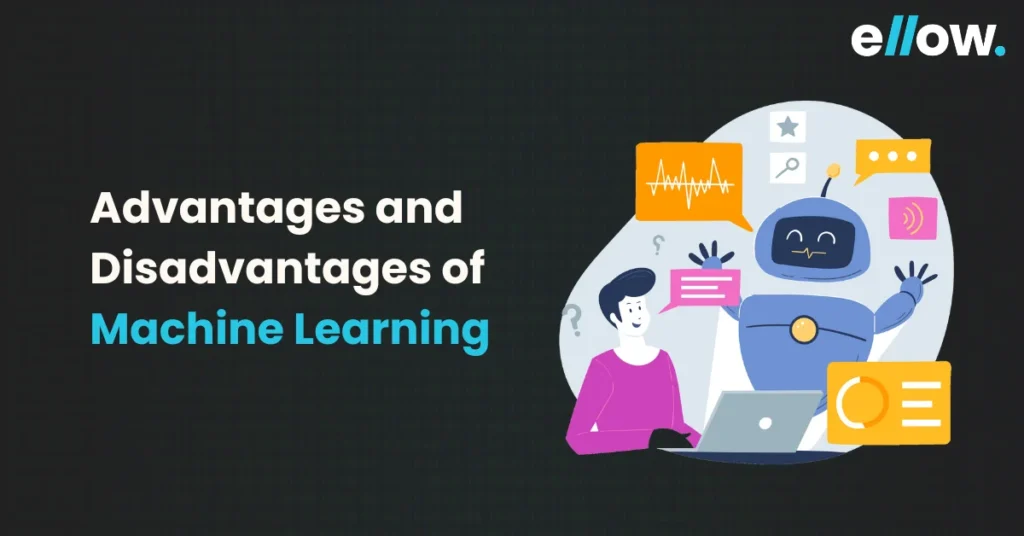Machine Learning (ML) is swiftly transforming industries, making it a cornerstone of operations across healthcare, finance, and beyond. The global ML market is expected to reach an impressive USD 528.10 billion by 2030, according to forecasts.
Furthermore, McKinsey predicts that by the same year, 70% of companies will have integrated AI technology into their processes.
This remarkable growth trajectory underscores the increasing significance of Machine Learning in the technological landscape. As a result, the demand for Machine Learning engineers is on the rise, presenting a promising career avenue for individuals proficient in this field.
Moreover, the emergence of tools like ChatGPT and platforms such as Gemini exemplify the practical application of ML and AI beyond theoretical discussions, showcasing their transformative impact on the digital world.
Let’s delve into the intricate world of Machine Learning, exploring its Advantages and Disadvantages to make well-informed decisions.
What is Machine Learning and where is it used?
Machine learning is a branch of artificial intelligence that enables computers to learn from data and improve over time without being explicitly programmed. It is like teaching a computer to recognize patterns and make decisions based on examples it is given.
It is used in various aspects of our lives, making tasks more efficient and accurate:
- Personalized Recommendations: Platforms like YouTube, Instagram, and Facebook use machine learning to suggest content tailored to individual preferences. For instance, if you engage with certain posts, the algorithm learns from your behavior and recommends similar ones.
- Human Resource Information Systems (HRIS): HRIS systems employ machine learning to sift through job applications and identify the most suitable candidates based on various criteria. This streamlines the hiring process and ensures better matches between job seekers and employers.
- Business Intelligence (BI): Machine learning algorithms in BI software help organizations identify trends, anomalies, and insights within their data. Businesses can make informed decisions and gain a competitive edge by analyzing large datasets.
- Customer Relationship Management (CRM): CRM systems leverage machine learning to analyze customer interactions and predict behavior. This enables businesses to prioritize sales efforts, respond to inquiries promptly, and personalize marketing campaigns for better engagement.
- Virtual Assistants: Virtual assistants like Siri, Alexa, and Google Assistant utilize machine learning to better understand and respond to user queries. By processing natural language and context, these assistants provide tailored assistance and perform tasks on behalf of users.
- Self-Driving Cars: Machine learning algorithms power the decision-making processes in autonomous vehicles. By analyzing sensor data and learning from past experiences, self-driving cars navigate roads, detect obstacles, and make real-time adjustments to ensure safe and efficient travel.
Advantages of Machine Learning:
- Learning Capability:
Machine Learning algorithms have the remarkable ability to learn from the data provided to them. As they receive more data, they continuously refine their models, leading to enhanced accuracy and efficiency in predictions and decision-making without the need for constant reprogramming. This adaptability makes ML solutions highly potent and adaptable over time.
For instance, companies like Amazon and Walmart leverage ML algorithms to scrutinize vast customer data sets, uncovering hidden correlations and preferences to suggest personalized product recommendations, thereby enhancing customer satisfaction and driving sales.
- Automation:
A key advantage of Machine Learning is its capacity to automate repetitive and time-consuming tasks, leading to improved productivity, cost savings, and minimized errors within organizations. By delegating routine tasks to ML-powered systems, human resources are liberated to concentrate on innovation and addressing complex challenges.
For example, ML-driven chatbots deployed in customer service streamline interactions by promptly addressing inquiries, recommending products, and comparing prices, thereby reducing waiting times and augmenting customer satisfaction. Furthermore, human agents can focus on resolving intricate issues, thereby enhancing overall business efficiency.
- Pattern Identification:
Machine Learning excels in discerning intricate trends and patterns within vast and complex datasets, catalyzing transformative advancements across various industries. In healthcare, ML algorithms analyze diverse data sources such as medical images and patient records to facilitate early disease detection and tailor treatment plans to individual patients.
Similarly, in finance, ML models are adept at identifying anomalous market behaviors, aiding in the prediction of financial risks and opportunities. Additionally, ML algorithms scrutinize consumer behavior patterns for companies like Amazon, facilitating accurate predictions regarding future purchasing trends.
- Variety of Applications:
Machine Learning exhibits exceptional versatility, permeating virtually every sector and facet of modern life. In finance, ML underpins risk assessment and fraud detection initiatives, while healthcare leverages ML for tasks ranging from diagnosis to drug discovery and personalized medicine.
Moreover, ML enhances quality control and optimizes supply chains in the manufacturing sector. Even creative domains benefit from ML innovations, with algorithms generating content such as text, music, and videos. Many everyday conveniences, such as GPS navigation and spam filters, rely on machine learning algorithms, underscoring the pervasive impact of this technology on contemporary society.
Disadvantages of Machine Learning
While machine learning offers promising advantages, it comes with notable drawbacks. Here are some key disadvantages:
- Data Acquisition
Machine learning algorithms rely heavily on the data they’re trained on, making data quality paramount. Obtaining accurate and reliable data can be challenging, especially for sensitive domains like healthcare or finance, due to privacy and ethical concerns. Additionally, data collection from surveys can be prone to errors, resulting in less accurate models.
- High Chances of Error
Despite careful planning, machine learning systems can still produce errors, particularly if the training data is flawed or biased. This “Garbage In, Garbage Out” principle underscores the importance of vigilance in monitoring and correcting errors, especially in critical fields like healthcare or finance where inaccurate predictions can have serious consequences.
- Time-consuming
Processing and training machine learning models can be time-intensive, especially with large datasets. Data preparation, model selection, and training iterations may take days, weeks, or even months, depending on project complexity. Moreover, handling massive datasets may require significant computational resources, prolonging development cycles and increasing costs.
- Expensive
Implementing machine learning solutions can incur substantial costs. Acquiring, cleaning, and labeling large-scale datasets is an expensive process. Training complex models, particularly on large datasets, often demands specialized hardware like GPUs, which can be costly to acquire or rent. Additionally, ongoing monitoring, updates, and retraining add to long-term expenses.
Components of Machine Learning
Machine learning involves several key components that work together to enable computers to learn from data and make predictions or decisions. These components include:
- Representation
Representation refers to how data is structured and presented to the machine learning algorithm. It encompasses the format and organization of input data, as well as the features extracted from the data. Effective representation is crucial for the algorithm to learn meaningful patterns and relationships within the data.
- Evaluation
Evaluation involves assessing the performance of machine learning models. It includes methods for measuring how well a model generalizes to unseen data and how accurately it predicts outcomes. Evaluation metrics vary depending on the specific task and objectives of the machine learning project. Common evaluation techniques include cross-validation and holdout validation.
- Optimization
Optimization is the process of refining and improving machine learning models to enhance their performance. It involves adjusting model parameters or hyperparameters to minimize errors or maximize accuracy. Optimization techniques aim to find the best possible model for a given task by iteratively adjusting the model based on feedback from the evaluation process.
Working Models of Machine Learning
Machine learning models can be broadly categorized into two main types: unsupervised learning and supervised learning.
- Unsupervised Learning
Unsupervised learning involves discovering patterns or structures in data without explicit guidance or labeled outcomes. Common algorithms used in unsupervised learning include clustering algorithms like K-Means, which group similar data points together based on their features. Unsupervised learning is useful for tasks such as data exploration, anomaly detection, and dimensionality reduction.
- Supervised Learning
Supervised learning, on the other hand, relies on labeled data to train predictive models. It involves learning a mapping from input variables to output variables based on example input-output pairs. Supervised learning tasks include classification, where the goal is to predict categorical labels, and regression, where the goal is to predict continuous numerical values. Popular supervised learning algorithms include decision trees, support vector machines, and neural networks.
Top Machine Learning Companies
- iTechArt: iTechArt is a leading machine learning company known for its expertise in developing cutting-edge solutions for various industries.
- Netguru: Netguru stands out for its innovative approach to machine learning, offering tailored solutions to meet the unique needs of each client.
- MobiDev: MobiDev excels in leveraging machine learning technologies to create scalable and efficient software solutions, enhancing business processes across diverse sectors.
- ScienceSoft: With a strong focus on research and development, ScienceSoft delivers advanced machine-learning solutions that drive business growth and innovation.
- Infopulse: Infopulse is renowned for its comprehensive machine learning services, helping businesses harness the power of data for strategic decision-making and optimization.
- InDataLabs: InDataLabs specializes in predictive analytics and machine learning algorithms, empowering businesses to gain actionable insights and stay ahead in their respective markets.
- DogTown Media: DogTown Media offers bespoke machine learning solutions, utilizing state-of-the-art technologies to solve complex business challenges and drive digital transformation.
- Antworks: Antworks provides end-to-end machine learning services, combining domain expertise with advanced analytics to deliver impactful solutions for clients worldwide.
- Xicom Technologies: Xicom Technologies delivers innovative machine-learning solutions tailored to the specific requirements of each client, helping businesses unlock new opportunities and achieve sustainable growth.
- Science Soft: Science Soft’s machine learning expertise spans various industries, offering customizable solutions that optimize processes, enhance decision-making, and drive business success.
Conclusion
While Machine Learning technology comes with its share of drawbacks, its remarkable benefits far outweigh them. The field is dynamic and continuously advancing, with organizations tirelessly working to mitigate any shortcomings. Consequently, the demand for skilled ML engineers is soaring. Find your next machine learning expert with ease through ellow.io‘s hiring services.
Recommended Reads
What are the Components of AI?
AI in Recruitment: A Definitive Guide
New Technology trends in recruitment to watch for in 2024
AI Trends in Recruitment: Revolutionizing the Hiring Landscape
High-demand IT Jobs for 2024: Skills that will get you hired
Top AI in Hiring Statistics in 2024
FAQs
What are the advantages of machine learning?
Machine learning offers several advantages, including automation of repetitive tasks, faster and more accurate decision-making, the ability to handle large volumes of data efficiently, and the potential for discovering insights and patterns that may not be apparent through traditional methods.
How does machine learning benefit businesses?
Machine learning can benefit businesses by optimizing processes, improving customer experiences through personalized recommendations, increasing operational efficiency, identifying fraud or anomalies in real-time, and enabling predictive maintenance to reduce downtime and costs.
What are the disadvantages of machine learning?
Some disadvantages of machine learning include the need for substantial amounts of high-quality data for training, the potential for bias in algorithms, the requirement for skilled professionals to develop and maintain ML systems, the risk of overfitting or underfitting models, and concerns about privacy and data security.
How does machine learning impact job roles and employment?
Machine learning may lead to the automation of certain tasks, potentially affecting job roles in industries such as manufacturing, transportation, and customer service. However, it also creates opportunities for new roles in data science, machine learning engineering, and AI ethics, highlighting the importance of upskilling and adaptation in the workforce.
What industries can benefit most from machine learning technology?
Virtually every industry can benefit from machine learning technology. Some of the industries that stand to gain the most include healthcare (for disease diagnosis and personalized treatment), finance (for fraud detection and risk assessment), e-commerce (for recommendation systems and demand forecasting), manufacturing (for predictive maintenance and quality control), and marketing (for targeted advertising and customer segmentation).









